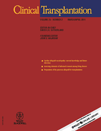Perioperative anticoagulation and antiplatelet therapy in renal transplant: is there an increase in bleeding complication?
Abstract
Eng M, Brock G, Li X, Chen Y, Ravindra KV, Buell JF, Marvin MR. Perioperative anticoagulation and antiplatelet therapy in renal transplant: is there an increase in bleeding complication? Clin Transplant 2011: 25: 292–296. © 2010 John Wiley & Sons A/S.
Abstract: Background: Renal transplant recipients may have comorbidities requiring anticoagulation or antiplatelet therapy. While the effects of warfarin may be neutralized with plasma infusion, those of aspirin and clopidogrel are not easily reversible and may be associated with an increased risk of bleeding. We conducted this study to evaluate the risk of bleeding complications in patients receiving perioperative anticoagulation or antiplatelet therapy.
Methods: Medical records of patients who underwent renal transplantation from July 1, 2005 to April 30, 2009 were retrospectively reviewed. Patients receiving perioperative anticoagulation or antiplatelet therapy were identified. The incidence of reoperation, transfusion utilization and decrease in serum hemoglobin from pre-operative value (ΔHgb) were compared to those on no therapy.
Results: Of the 327 patients identified, 105 received pre-operative anticoagulation or antiplatelet therapy, 28 received therapy post-operatively, while 213 patients received no therapy. The incidence of reoperation, transfusion utilization and ΔHgb were not significantly increased with pre-operative anticoagulation or antiplatelet therapy. With post-operative heparin infusion, the incidence of reoperation and transfusion utilization were significantly increased (p values < 0.001). Patients with activated partial thromboplastin times (aPTT) >80 s experienced significant bleeding complications.
Conclusion: A supratherapeutic aPTT with post-operative heparin infusion was associated with the greatest risk of bleeding complication.




